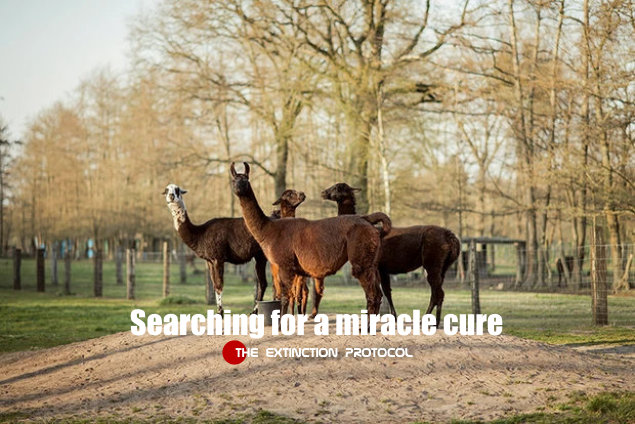
Scientists hope a key to COVID-19 antibody research could currently be grazing peacefully in a Belgian field — in the shape of a four-year-old llama named Winter. The llama, which researchers vaccinated against the coronaviruses that cause MERS and SARS in 2016, “produced antibodies in response to vaccination, which were able to really potently neutralize both of those viruses,” explained Daniel Wrapp, a PhD candidate at the University of Texas at Austin. After the pandemic became world news earlier this year, the team tested those antibodies on cells infected with COVID-19 in a laboratory environment — and neutralized the virus, Wrapp explained.
The findings were published last week in the scientific journal Cell, in collaboration with researchers at Ghent University in Belgium. The work began four years ago, long before the COVID-19 pandemic, as research into MERS and SARS, he said. “We’re really excited about potentially exploring this antibody as a therapeutic to help fight off COVID-19,” Wrapp told The Current’s Matt Galloway. Llamas like Winter are well suited to this kind of research because they produce nanobodies — about half the size of the antibodies a human would make — that occur in sharks and camelids (such as llamas, alpacas and camels).
“That reduced size makes them potentially really interesting therapeutic candidates because they can wedge themselves into little crevices that our larger antibodies wouldn’t otherwise be able to access,” said Wrapp. All llamas are theoretically capable of producing the same nanobodies as Winter, he said, adding that her species make “surprisingly good laboratory animals. They take up a lot of space, but they’re apparently a lot of fun to work with.” –CBC
How would we administer this antibody treatment to a human patient?
It would be administered much like any other conventional antibody treatment, by injection. Really, the nice thing about an antibody treatment as opposed to a vaccine is that you could administer it to people who are already infected, and it would rapidly begin to reduce the disease burden and hopefully reduce the severity of the symptoms.
Can you explain the difference between an antibody treatment and a vaccine?
A vaccine has to be administered probably about two months before exposure to the infectious agent in order to be effective. That’s because you want to present the human immune system with something that looks like a pathogen so that it can raise its own antibodies and fight off infection if it’s ever presented with that pathogen infection scenario. Unfortunately, that’s sort of useless if you’ve already been infected. So, in that case, you have an antibody treatment for somebody who is already infected to help them get better more quickly.
Could the treatment also potentially be used as preventative measures in, for example, key workers?
Yes, I’m glad you brought up essential workers because people like health care workers could be administered this drug and then it would reduce or prevent their susceptibility to infection when treating patients. –Science Focus

Comments
Post a Comment